Police arrested more than 50 people, including members of the clergy and the radical intellectual and activist Cornel West, during a day of civil disobedience protests on Monday over the killing in Ferguson of an unarmed 18-year-old African American man, Michael Brown, by a white police officer two months ago.
Several hundred people marched on Ferguson police station for a “Moral Monday” protest on the final day of a “Weekend of Resistance” that brought activists from across the US to demand that Darren Wilson, the officer who shot Brown, be put on trial and to protest over broader issues of racial profiling and use of excessive force by police officers in other places.
In a series of guerrilla protests, demonstrators unfurled banners at an NFL game hosted by the St Louis Rams, laid siege to several WalMart stores and stormed St Louis city hall, drawing the promise of a meeting with the mayor to discuss policing.
The protests began in the pouring rain as about 100 members of the clergy led the march on Ferguson police station from a local church up the street. They included a female rabbi from Detroit, a Quaker minister from Portland, Oregon, and the dean of a St Louis cathedral.
Initially they were met at Ferguson station by only a small contingent of local police. During a lengthy standoff reverends, rabbis and secular activists sang civil rights-era songs and appealed to the policemen and one woman in front of them to confess and repent. None took up the offer.
The protesters drew a chalk outline in front of the police representing Brown’s body lying in the street with white candles placed to mark where five bullets hit him and a sixth red one for the shot to the head that killed him.
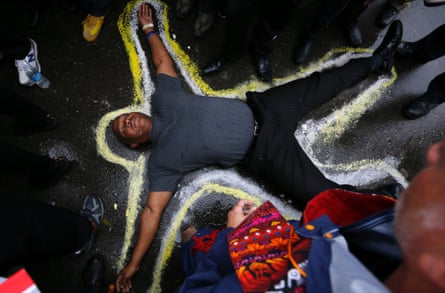
One woman carrying a sign reading “Don’t shoot” walked up to a Ferguson police officer whose name tag said M Brown. She put his face close to his and said: “I want to hug you, not hate you.”
The officer then hugged the woman, who gave her name as Dragonfly from the Church of Stop Shopping, an activist group based in New York City. But the mood toughened as a line of police officers in riot gear moved in and the crowd divided into those who were prepared to be arrested and those who were not.
Those who were pressed toward the police station doors, barricaded with wood. Protesters chanted: “Fight back” and “Black lives matter, all lives matter.”
Some went up close to the police line and held up long mirrors so officers in riot gear could see themselves. The group used a well-honed tactic of linking arms and pressing against the police line until they were detained. West, a Baptist minister, had said at a rally on Sunday evening that he had come to St Louis to get arrested.
Forty-two people were arrested at the police station. Among the others detained was Pastor Michael McBride, a leader of the PICO National Network of faith-based community organisations, who issued a statement afterwards saying his actions were “an act of resistance and repentance”.
“This afternoon’s arrests in Ferguson are another example of how activists, including prominent local faith leaders, members of local faith congregations, students and community leaders, are being falsely accused of inciting violence when the truth in plain sight is that we are seeking justice,” it said.
Compared with earlier protests, the police in Ferguson and St Louis have generally held back over the past few days in a deliberate attempt to avoid confrontations that would inflame the situation further.
Chrissy Kirchhoefer, an urban farmer from neighbouring Florissant, said she was surprised at the relative restraint of the police. “For the most part it’s civilised,” she said. “I can’t not be here,” she said as she attempted to get shelter under a too-small umbrella. “Here in St Louis we’ve been living with this for so long it’s become normalised. It’s like a boil that’s been lanced and it takes time for the pus to come out.”
Kirchhoefer was among a large crowd at a mass meeting on Sunday evening at which younger African Americans challenged an older generation of leaders, accusing them of lacking direction in combatting the use of excessive force and racism by the police.
“The younger folks were able to voice their disrespect at the inaction of their elders,” she said.
“It was the passing of the baton.”
Some of those same young people were outside Ferguson police station and questioning the tactic of using peaceful protest to engineer arrests.
“They arrest them, they let them go. What good does that do?” asked Laverne Henderson, a 20-year-old from St Louis. “That won’t change the police. They’ve got their guns and they’re still in charge and they can still arrest us any time they want to for no reason at all.”
Later in the day, about 60 protesters stormed into St Louis city hall and unfurled a banner in the rotunda. The group called for all police officers to wear body cameras and for an independent body to examine shootings by the police.
The mayor, Francis Slay, was not at city hall but the St Louis Post-Dispatch reported that his chief of staff, Jeff Rainford, met with a representative of the group and said the mayor would meet with the protesters soon.
Next line of religious leaders to be arrested at #ferguson police station #fergusonoctober pic.twitter.com/DP2WER8vJB
— Chris McGreal (@ChrisMcGreal) October 13, 2014
“We are going to listen to them,” said Rainford. “You are going to see action from this.”
Six protesters were arrested as a group of demonstrators moved between several branches of WalMart which was targeted because of the shooting of John Crawford by police in an Ohio store in August. Other protesters descended on a political fundraiser attended by Senator Claire McCaskill.
About 60 people bought seats at the NFL game between the Rams and the the 49ers where they unfurled banners reading “Rams fans know black lives matter on and off the field”.
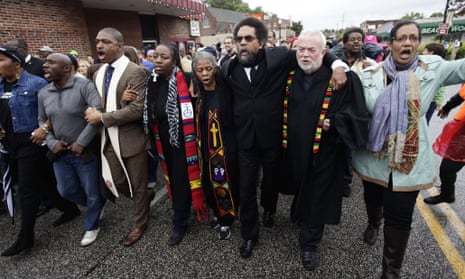
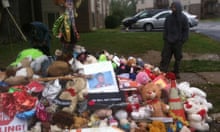
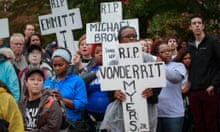
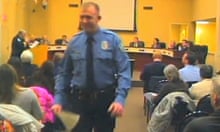
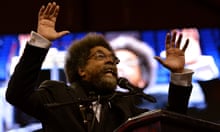
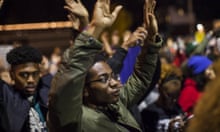
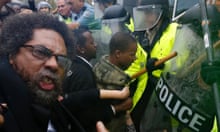
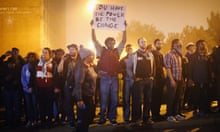
Comments (…)
Sign in or create your Guardian account to join the discussion